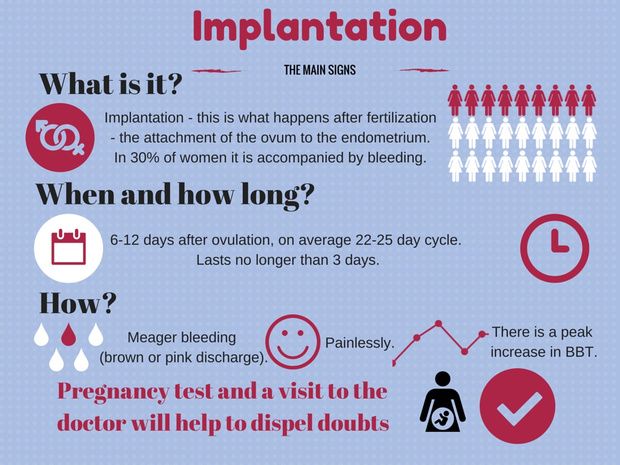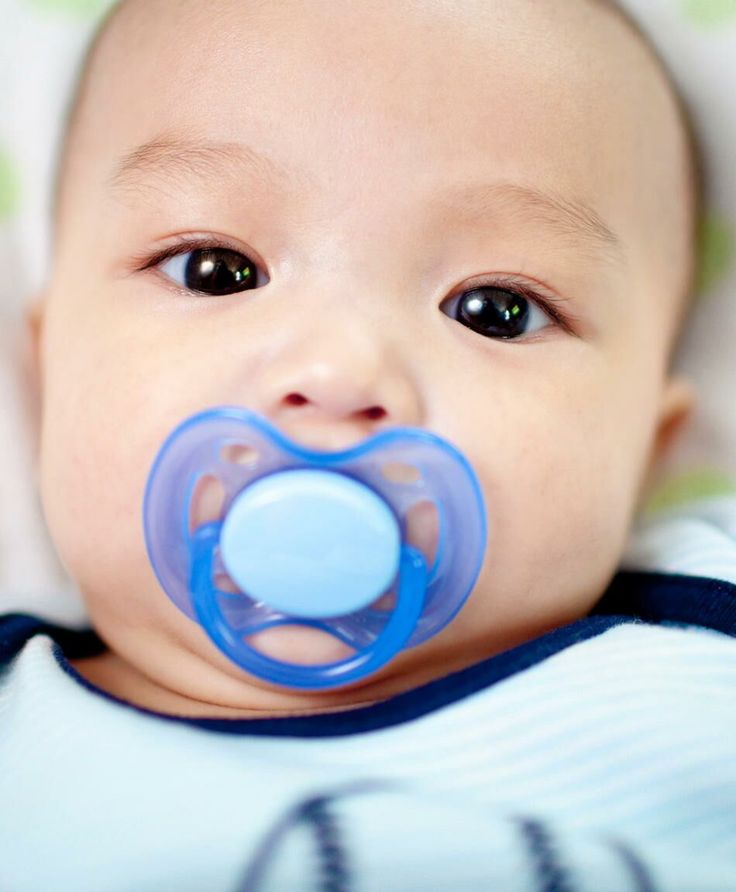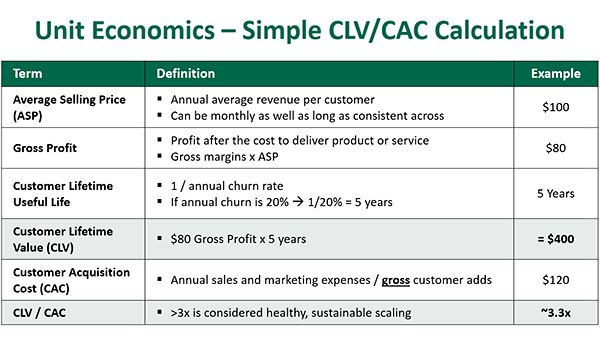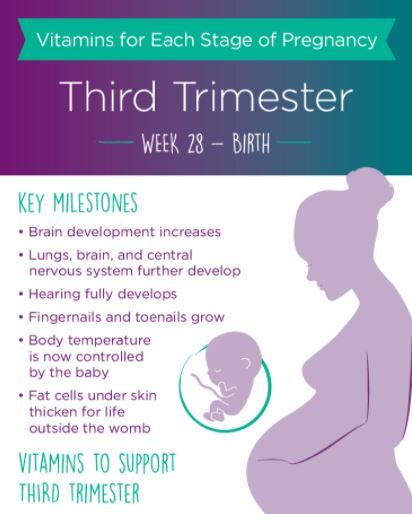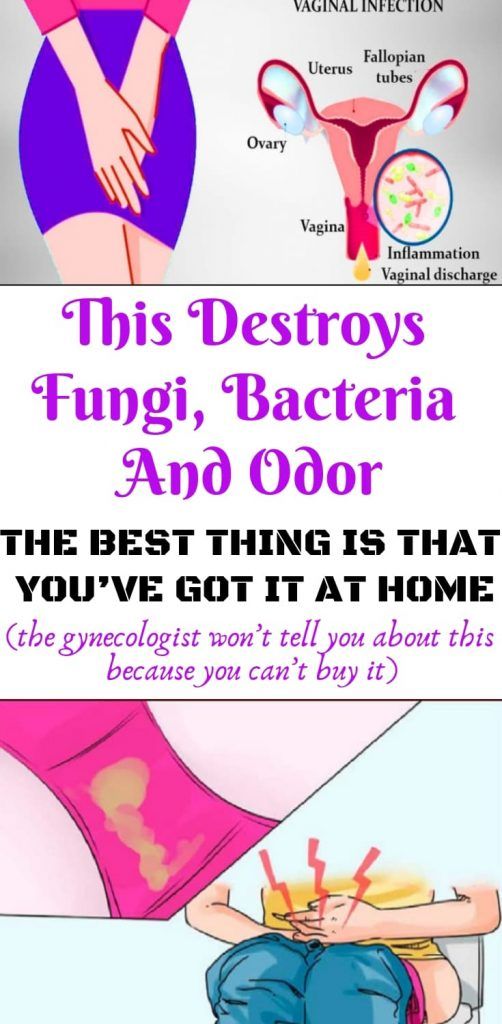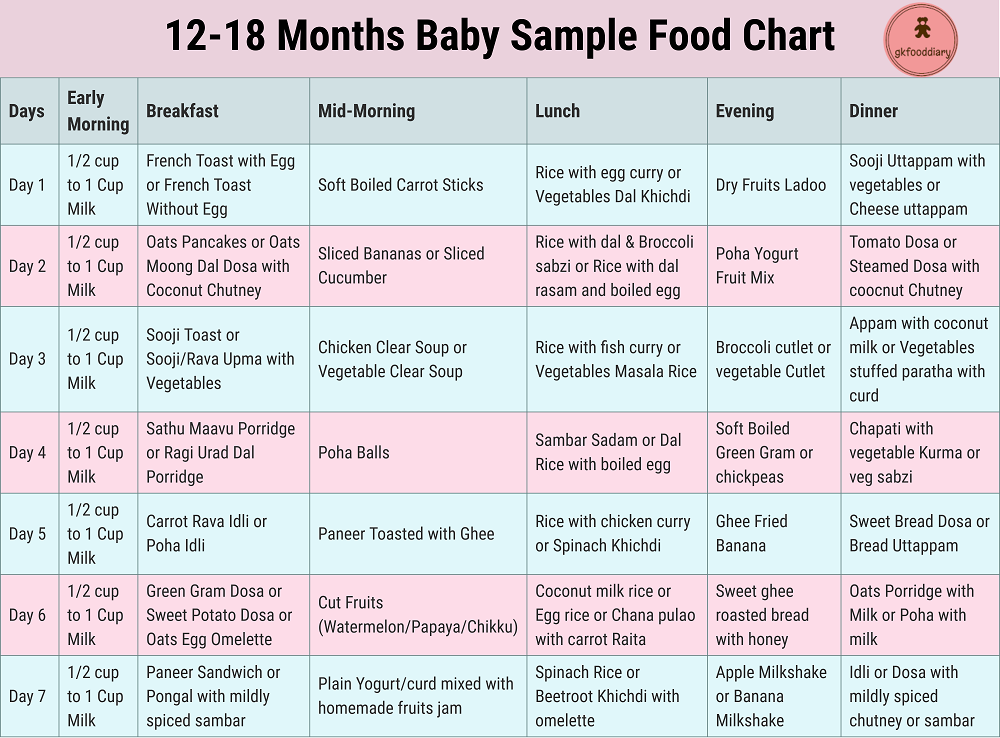Can you get pregnant after 35
Chances, Fertility, and What to Expect
Written by Rachel Reiff Ellis
In this Article
- By the Numbers
- Reasons for Fertility Drop
- Your Options
You’re hoping to make a baby and wondering about your chances at “advanced maternal age” (the medical term for women pregnant at 35 or later). Age is one of the key factors that predict your ability to conceive. Your fertility starts to decline at age 30 and keeps on dropping steadily until you hit menopause.
That said, it’s not only possible to deliver a healthy baby after age 35, it’s quite common. Here’s a look at the odds facing “older” mothers.
By the Numbers
You’re at your peak fertility in your 20s. Healthy women that age who are trying to conceive have about a 1 in 4 chance of getting pregnant during a single menstrual cycle. In other words, 25 out of 100 women will succeed per month.
By age 40, an average healthy woman has only a 5% chance of getting pregnant per cycle.
At the same time, the likelihood of miscarriage climbs with your age. A typical 40-year-old has about a 40% chance of losing the pregnancy. That compares to less than 15% for someone in their 20s.
By the time you’re over 45, the American College of Obstetricians and Gynecologists says getting pregnant naturally is “unlikely for most women.”
Reasons for Fertility Drop
As you age, so do your eggs. And you have fewer of them, too. You’re born with all the eggs you’ll ever have in your life, about 1 million. By the time you hit puberty, you may have about 300,000 left. At 37, you’re down to just 25,000 -- or 2.5% of your starting count. That matters because the fewer eggs in your ovaries, the lower your odds for conception.
Even if you do get pregnant, your older eggs are more likely to have abnormal chromosomes, which may raise your chance of miscarrying your baby. Also, women after 35 are more likely to have problems like endometriosis and uterine fibroids that make it harder for you to get pregnant.
The quality of your partner’s sperm also matters. As men age, their sperm tend to swim slower and begin to lose their shape. But sperm quality doesn’t drop steeply until after men enter their 60s.
Your Options
Some older women trying to conceive may need more than just more time and help from Mother Nature. If so, several types of reproductive medicine may make pregnancy possible.
If you’re under 35, your doctor may recommend fertility treatments if you’ve tried without success to get pregnant for more than a year. That window shortens to 6 months if you’re 35 or older. And if you have any medical issues that could hurt your chances of conceiving, your doctor may advise that you get fertility help right away. They may suggest:
- Drugs that stimulate egg production
- In vitro fertilization (IVF)
If you know you’d like to have a baby someday but aren’t ready now, one option is to freeze your fertilized egg for IVF later. The quality of your embryos likely will be highest when taken closest to your most fertile years. A clinic will test your eggs for viability, or the chance that they’ll produce a healthy pregnancy.
A clinic will test your eggs for viability, or the chance that they’ll produce a healthy pregnancy.
Another option is to use an egg or embryo donor. A clinic will use a healthy egg from a younger woman and fertilize it with your partner’s sperm or donated sperm, and implant it in your uterus, so you can carry and deliver the baby.
Trying for pregnancy after 35
Trying for pregnancy after 35 | Pregnancy Birth and Baby beginning of content5-minute read
Listen
Many people try for a baby after 35. Around 1 in 5 pregnant Australians (20%) are between 35 and 39 years of age. There are risks and challenges you should know about when trying for pregnancy after 35 years.
It can be harder to get pregnant now than when you were younger. Females are most fertile in their 20s.
If you've been trying to get pregnant for over 6 months, you should see your doctor to discuss your fertility.
In general:
- Female fertility begins to decline faster after the age of 30. It declines more significantly after the age of 35.
- Male fertility begins to decline faster after the age of 40. It declines more significantly after the age of 45.
The older you and your partner are, the more likely it is to take longer to conceive. This can also increase the risk of pregnancy complications.
Why does your fertility decline?
Female fertility
At birth, a female’s ovaries have all the eggs they will ever have — between 1 million and 2 million eggs. By puberty, half of the eggs will be gone.
As you get older, the number of eggs continues to reduce. Eggs age as the person does, and older eggs don’t fertilise as easily, but still, only one is needed.
Male fertility
Males produce sperm constantly. However, the number of sperm made reduces with age. The quality of the sperm also begins to decline. These factors reduce fertility.
The quality of the sperm also begins to decline. These factors reduce fertility.
How do I improve my chances of becoming pregnant?
If you are female, you will have a better chance of getting pregnant if you understand your menstrual cycle. The average cycle is 28 days, but it can vary for different people.
If your cycle is regular, you will probably ovulate 2 weeks before the start of your next period. So, you can work out the best time for sexual intercourse to result in pregnancy.
If you are male, talk with your partner about their menstrual cycle.
Both you and your partner should be as healthy as you can be. Apart from anything else, this really will help your chances of getting pregnant. You can both:
- eat a healthy diet
- be a healthy weight
- check for and treat any sexually transmitted infections
- avoid alcohol
- if you smoke, stop smoking and avoid passive smoking when possible
When should you ask for help?
You should see a doctor if you’re a female, over 35 years, and have been trying to get pregnant for over 6 months.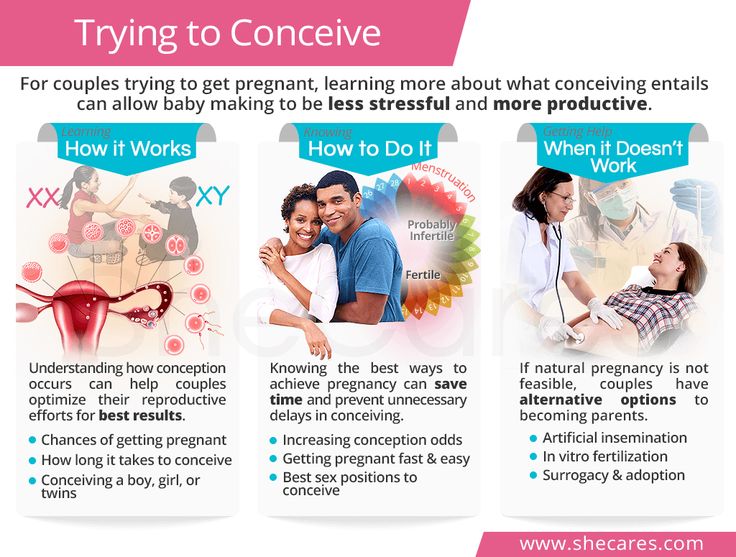
People under 35 years, should have regular unprotected sexual intercourse for 12 months. If you don’t get pregnant in that time you should see your doctor.
However, if you have endometriosis or another condition that affects your fertility, you can visit your doctor sooner.
Treatments
There are many options available for people who are having trouble getting pregnant. The treatment depends on the cause of the fertility problem.
First, you and your partner will have a number of fertility tests. These might include:
- blood tests
- sperm tests
- checks for sexually transmitted infections
- an ultrasound
Depending on the results, your doctor might suggest treatments such as:
- hormone therapy
- IVF and variations such as intracytoplasmic sperm injection (ICSI)
- artificial insemination
These treatments can all work. However, none of them are guaranteed.
For example, most people who have IVF have a:
- 33% chance of taking home a baby after one cycle
- a 54% chance of taking home a baby after 8 cycles
However, for people aged 40 to 44 years, this decreases to:
- 11% chance of taking home a baby after one cycle
- about a 38% chance of taking home a baby after 8 cycles
What happens if I get pregnant?
If you are over 35 years and become pregnant, it’s important to receive good antenatal care. This is because there are some things to watch out for.
This is because there are some things to watch out for.
As the age of parents increases, the chance of pregnancy complications also does. These include:
- high blood pressure
- pre-eclampsia
- caesarean sections
- gestational diabetes
- chance of twins
- miscarriage
Your new baby may also have a higher risk of:
- birth defects, including cardiovascular and musculoskeletal defects
- disorders including autism, ADHD
- mental health concerns
- childhood cancer
You might also want to talk to your doctor or midwife about:
- genetic counselling
- tests like amniocentesis and chorionic villus sampling
Speak to a maternal child health nurse
Call Pregnancy, Birth and Baby to speak to a maternal child health nurse on 1800 882 436 or video call. Available 7am to midnight (AET), 7 days a week.
Sources:
AIHW (Australia’s mothers and babies), Journal of Assisted Reproduction Genetics (Effects of aging on the male reproductive system), Journal of Assisted Reproduction Genetics (Complications of advanced maternal age), The Medical Journal of Australia (Assisted reproductive technology in Australia and New Zealand: cumulative live birth rates as measures of success), RACGP/AFP (Male infertility – The other side of the equation), RACGP AFP (Assessment of female fertility in the general practice setting), Family Planning NSW (Maximising natural fertility)Learn more here about the development and quality assurance of healthdirect content.
Last reviewed: July 2022
Back To Top
Related pages
- Understanding fertility
- Being pregnant after 40
- Fertility treatments
- Fertility tests and treatments
- Good fertility health
Need more information?
How Age Matters For Your Fertility | Your Fertility
It's a biological fact that as women and men age, their potential to have children decreases, although the exact time when this starts to happen can vary among individuals
Read more on Your Fertility website
Test your fertility knowledge | Your Fertility
Correct answer: False Although living a healthy life will certainly help if you’re trying to conceive, the age of the mother-to-be is the single most important factor
Read more on Your Fertility website
Getting pregnant - MyDr.
 com.au
com.au Getting pregnant is easy for some women, but for others it can be a difficult. Women are most fertile between 20 and 24 years of age, after which fertility declines.
Read more on myDr website
Reproductive health | Australian Government Department of Health and Aged Care
Good reproductive health supports individuals and couples to decide whether and when to have children. It can be affected by diseases, access to contraception and fertility issues. Find out what we’re doing to improve reproductive health in Australia.
Read more on Department of Health and Aged Care website
Fertility treatment journey | VARTA
Things to consider Possible emotional effects of fertility treatments Fertility treatments are psychologically and emotionally demanding
Read more on Victorian Assisted Reproductive Treatment Authority website
Fertility treatment explained | VARTA
Understanding fertility treatment There are many types of fertility treatments available, ranging from simple interventions such as medication to help a woman ovulate, through to more complicated procedures known as assisted reproductive treatment (ART).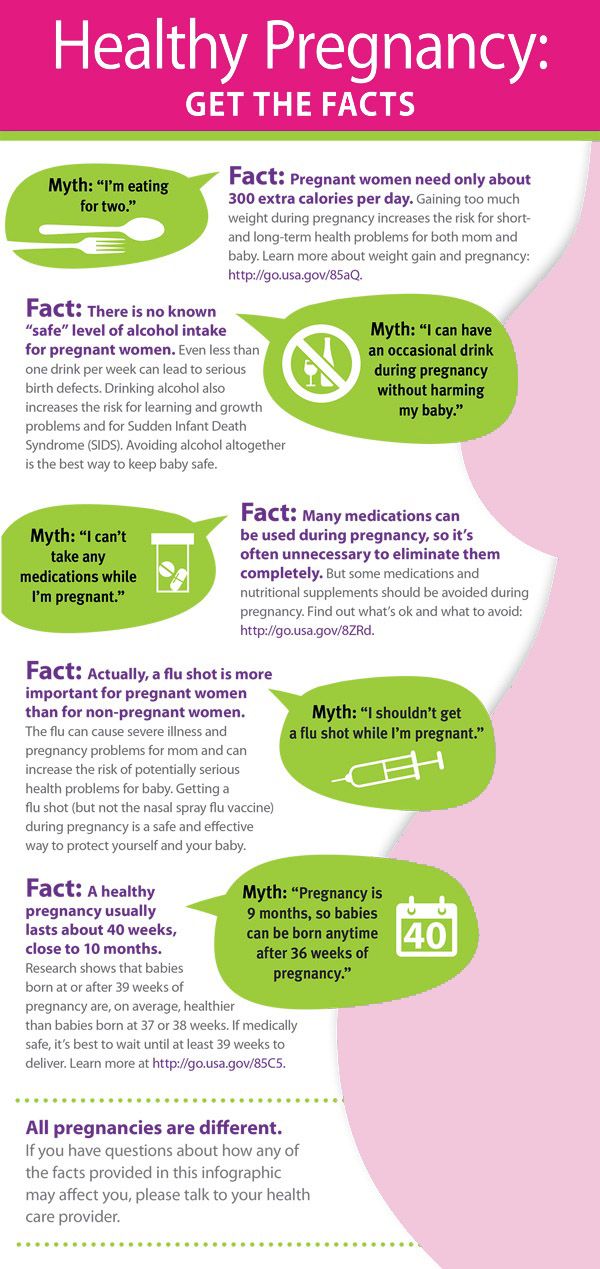 ART, also known as assisted reproductive technology, refers to medical and scientific methods used to help people conceive. Fertility treatments are used: to treat infertility for people who can’t become pregnant, carry a pregnancy or give birth to reduce the chance of a baby inheriting a genetic disease or abnormality to preserve fertility. Types of treatment Depending on the cause of infertility, the following types of treatment may be recommended by your fertility specialist. This information provides a general overview of techniques available. Speak to your fertility clinic for more information. Ovulation induction (OI) Ovulation induction (OI) can be used if a woman is not ovulating or not ovulating regularly. It involves taking a hormone medication (tablets or injections) to stimulate ovulation. The response to the hormones is monitored with ultrasound and when the time is right, an injection is given to trigger ovulation (the release of the egg). Timing intercourse to coincide with ovulation offers the chance of pregnancy.
ART, also known as assisted reproductive technology, refers to medical and scientific methods used to help people conceive. Fertility treatments are used: to treat infertility for people who can’t become pregnant, carry a pregnancy or give birth to reduce the chance of a baby inheriting a genetic disease or abnormality to preserve fertility. Types of treatment Depending on the cause of infertility, the following types of treatment may be recommended by your fertility specialist. This information provides a general overview of techniques available. Speak to your fertility clinic for more information. Ovulation induction (OI) Ovulation induction (OI) can be used if a woman is not ovulating or not ovulating regularly. It involves taking a hormone medication (tablets or injections) to stimulate ovulation. The response to the hormones is monitored with ultrasound and when the time is right, an injection is given to trigger ovulation (the release of the egg). Timing intercourse to coincide with ovulation offers the chance of pregnancy.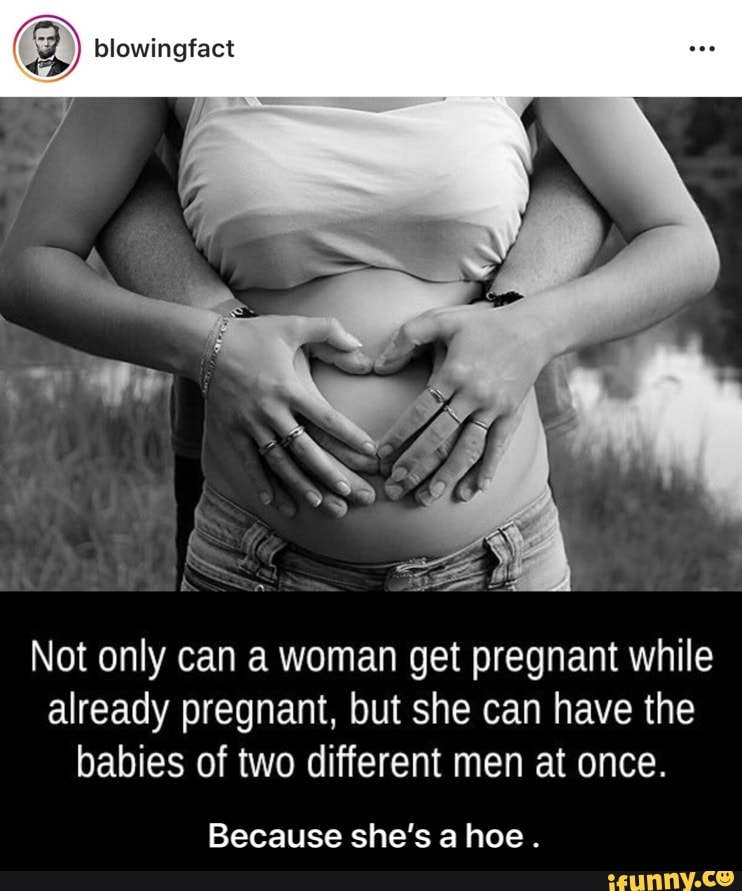 Artificial insemination or IUI Artificial insemination, which is sometimes called intrauterine insemination (IUI), involves insertion of the male partner’s (or a donor’s) sperm into a woman’s uterus at or just before the time of ovulation. IUI can help couples with so called unexplained infertility or couples where the male partner has minor sperm abnormalities. You can use the Unexplained infertility - exploring your options guide to better understand if IUI is a suitable option for you. IUI can be performed during a natural menstrual cycle, or in combination with ovulation induction (OI) if the woman has irregular menstrual cycles. If a pregnancy is not achieved after a few IUI attempts, IVF or intracytoplasmic sperm injection (ICSI) may be needed. In-vitro fertilisation (IVF) During IVF, the woman has hormone injections to stimulate her ovaries to produce multiple eggs. When the eggs are mature, they are retrieved in an ultrasound-guided procedure under light anaesthetic. The eggs and sperm from the male partner or a donor are placed in a culture dish in the laboratory to allow the eggs to hopefully fertilise, so embryos can develop.
Artificial insemination or IUI Artificial insemination, which is sometimes called intrauterine insemination (IUI), involves insertion of the male partner’s (or a donor’s) sperm into a woman’s uterus at or just before the time of ovulation. IUI can help couples with so called unexplained infertility or couples where the male partner has minor sperm abnormalities. You can use the Unexplained infertility - exploring your options guide to better understand if IUI is a suitable option for you. IUI can be performed during a natural menstrual cycle, or in combination with ovulation induction (OI) if the woman has irregular menstrual cycles. If a pregnancy is not achieved after a few IUI attempts, IVF or intracytoplasmic sperm injection (ICSI) may be needed. In-vitro fertilisation (IVF) During IVF, the woman has hormone injections to stimulate her ovaries to produce multiple eggs. When the eggs are mature, they are retrieved in an ultrasound-guided procedure under light anaesthetic. The eggs and sperm from the male partner or a donor are placed in a culture dish in the laboratory to allow the eggs to hopefully fertilise, so embryos can develop.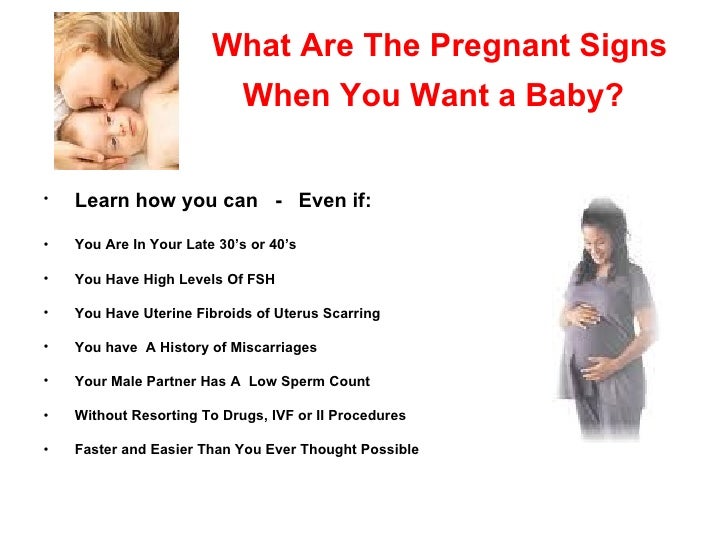 Three to five days later, if embryos have formed, one is placed into the woman's uterus in a procedure called embryo transfer. If there is more than one embryo, they can be frozen and used later. The IVF process: Is IVF safe? IVF is a safe procedure and medical complications are rare. But as with all medical procedures, there are some possible health effects for women and men undergoing treatment and for children born as a result of treatment. Read more about the possible health effects of IVF here. Understanding IVF success rates Clinics report success rates in different ways, so when comparing clinics’ success rates make sure you compare like with like or ’apples with apples’. Most importantly, you need to consider your own personal circumstances and medical history when you estimate your chance of having a baby with IVF. You can read more about interpreting success rates here. The chance of a live birth following IVF depends on many factors including the woman’s age, the man’s age and the cause of infertility.
Three to five days later, if embryos have formed, one is placed into the woman's uterus in a procedure called embryo transfer. If there is more than one embryo, they can be frozen and used later. The IVF process: Is IVF safe? IVF is a safe procedure and medical complications are rare. But as with all medical procedures, there are some possible health effects for women and men undergoing treatment and for children born as a result of treatment. Read more about the possible health effects of IVF here. Understanding IVF success rates Clinics report success rates in different ways, so when comparing clinics’ success rates make sure you compare like with like or ’apples with apples’. Most importantly, you need to consider your own personal circumstances and medical history when you estimate your chance of having a baby with IVF. You can read more about interpreting success rates here. The chance of a live birth following IVF depends on many factors including the woman’s age, the man’s age and the cause of infertility. Research using the Australian and New Zealand Assisted Reproduction Database calculated the chance of a woman having a baby from her first cycle of IVF according to her age. The results below apply to women who used their own eggs, and it includes the use of frozen embryos produced by one cycle of IVF: Under 34: 44 per cent chance of a live birth 35-39: 31 per cent chance of a live birth 40-44: 11 per cent chance of a live birth 44 and above: one per cent chance of a live birth. Costs of IVF In Australia, Medicare and private health insurers cover some of the costs associated with IVF and ICSI but there are also substantial out-of-pocket costs. The difference between the Medicare contribution and the amount charged by the clinic is the ‘out-of-pocket cost’. These costs vary, depending on the treatment, the fertility clinic and whether a patient has reached the Medicare Safety Net threshold. You can read more about costs here. Intracytoplasmic sperm injection (ICSI) ICSI (intracytoplasmic sperm injection) is used for the same reasons as IVF, but especially to overcome sperm problems.
Research using the Australian and New Zealand Assisted Reproduction Database calculated the chance of a woman having a baby from her first cycle of IVF according to her age. The results below apply to women who used their own eggs, and it includes the use of frozen embryos produced by one cycle of IVF: Under 34: 44 per cent chance of a live birth 35-39: 31 per cent chance of a live birth 40-44: 11 per cent chance of a live birth 44 and above: one per cent chance of a live birth. Costs of IVF In Australia, Medicare and private health insurers cover some of the costs associated with IVF and ICSI but there are also substantial out-of-pocket costs. The difference between the Medicare contribution and the amount charged by the clinic is the ‘out-of-pocket cost’. These costs vary, depending on the treatment, the fertility clinic and whether a patient has reached the Medicare Safety Net threshold. You can read more about costs here. Intracytoplasmic sperm injection (ICSI) ICSI (intracytoplasmic sperm injection) is used for the same reasons as IVF, but especially to overcome sperm problems. ICSI follows the same process as IVF, except ICSI involves the direct injection of a single sperm into each egg to hopefully achieve fertilisation. Because it requires technically advanced equipment, there are additional costs for ICSI. For couples with male factor infertility, ICSI is needed to fertilise the eggs and give them a chance of having a baby. But for couples who don’t have male factor infertility, ICSI offers no advantage over IVF in terms of the chance of having a baby. You can read more about what’s involved in
ICSI follows the same process as IVF, except ICSI involves the direct injection of a single sperm into each egg to hopefully achieve fertilisation. Because it requires technically advanced equipment, there are additional costs for ICSI. For couples with male factor infertility, ICSI is needed to fertilise the eggs and give them a chance of having a baby. But for couples who don’t have male factor infertility, ICSI offers no advantage over IVF in terms of the chance of having a baby. You can read more about what’s involved in
Read more on Victorian Assisted Reproductive Treatment Authority website
Maximising Natural Fertility | Family Planning NSW
Today people often leave plans for pregnancy until later in their adult lives. This is different to previous generations. Women are naturally more fertile in their 20s than their 30s but women are more often having children when they are aged 30-34 years old.
Read more on Family Planning NSW website
Vasectomy | Family Planning NSW
Vasectomy is a popular method of contraception for men. About one in four Australian men over the age of 40 has had a vasectomy.
Read more on Family Planning NSW website
Male fertility and conception- tips for getting pregnant by improving sperm health
Male fertility is vital for conception and a healthy pregnancy. Couples trying to get pregnant need to pay attention to factors which increase the chances of infertility in men. In addition to a healthy diet and regular exercise, treating sexual problems and avoiding recreational drugs helps boost male fertility.
Read more on Parenthub website
Effects of caffeine, alcohol and smoking on reproductive outcomes
Some lifestyle behaviours are known to affect fertility, pregnancy health and the health of the baby at birth and in adulthood. Here is what you need to know about how caffeine, alcohol and smoking affect fertility and reproductive outcomes.
Here is what you need to know about how caffeine, alcohol and smoking affect fertility and reproductive outcomes.
Read more on Your Fertility website
Disclaimer
Pregnancy, Birth and Baby is not responsible for the content and advertising on the external website you are now entering.
OKNeed further advice or guidance from our maternal child health nurses?
1800 882 436
Video call
- Contact us
- About us
- A-Z topics
- Symptom Checker
- Service Finder
- Linking to us
- Information partners
- Terms of use
- Privacy
Pregnancy, Birth and Baby is funded by the Australian Government and operated by Healthdirect Australia.
Pregnancy, Birth and Baby is provided on behalf of the Department of Health
Pregnancy, Birth and Baby’s information and advice are developed and managed within a rigorous clinical governance framework. This website is certified by the Health On The Net (HON) foundation, the standard for trustworthy health information.
This site is protected by reCAPTCHA and the Google Privacy Policy and Terms of Service apply.
This information is for your general information and use only and is not intended to be used as medical advice and should not be used to diagnose, treat, cure or prevent any medical condition, nor should it be used for therapeutic purposes.
The information is not a substitute for independent professional advice and should not be used as an alternative to professional health care. If you have a particular medical problem, please consult a healthcare professional.
Except as permitted under the Copyright Act 1968, this publication or any part of it may not be reproduced, altered, adapted, stored and/or distributed in any form or by any means without the prior written permission of Healthdirect Australia.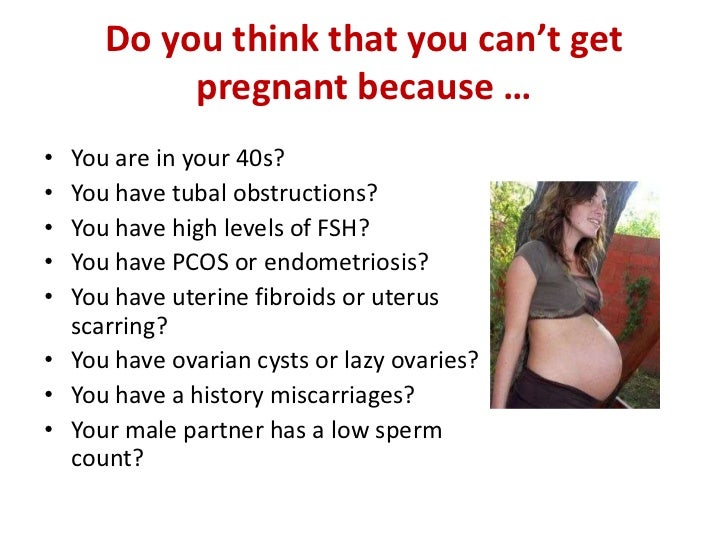
Support this browser is being discontinued for Pregnancy, Birth and Baby
Support for this browser is being discontinued for this site
- Internet Explorer 11 and lower
We currently support Microsoft Edge, Chrome, Firefox and Safari. For more information, please visit the links below:
- Chrome by Google
- Firefox by Mozilla
- Microsoft Edge
- Safari by Apple
You are welcome to continue browsing this site with this browser. Some features, tools or interaction may not work correctly.
How a woman's reproductive age affects the conception of a healthy child
Contents of the page
Get ready to get answers to these important questions. You will also learn about the features associated with the process of conception for women of different ages.
Women 20-24 years old
The age from 20 to 24 years is the best period for pregnancy. At this age, 90% of the eggs are genetically normal, and it is this fact that affects the conception of a healthy child. The probability of conceiving a healthy baby at this age and within a year of regular sexual activity is 96%.
At this age, 90% of the eggs are genetically normal, and it is this fact that affects the conception of a healthy child. The probability of conceiving a healthy baby at this age and within a year of regular sexual activity is 96%.
Here it is important to note that high chances of conception, unfortunately, do not always lead to the birth of a healthy child. The thing is that young people are less responsible for preparation and pregnancy, so some risk factors leading to complications during pregnancy are ignored. For example: bad habits, malnutrition, vitamin deficiency.
Therefore, it is important to have appropriate examinations at any age in order to feel confident in terms of health and not jeopardize the health of the unborn baby. nine0003
25-29 years old
Between the ages of 25 and 29, the chances of getting pregnant within a year of sexual activity are 86%, and the chances of miscarriage are no more than 10%.
Of course, you need to carefully prepare for pregnancy, monitor your health, nutrition, weight and avoid stress.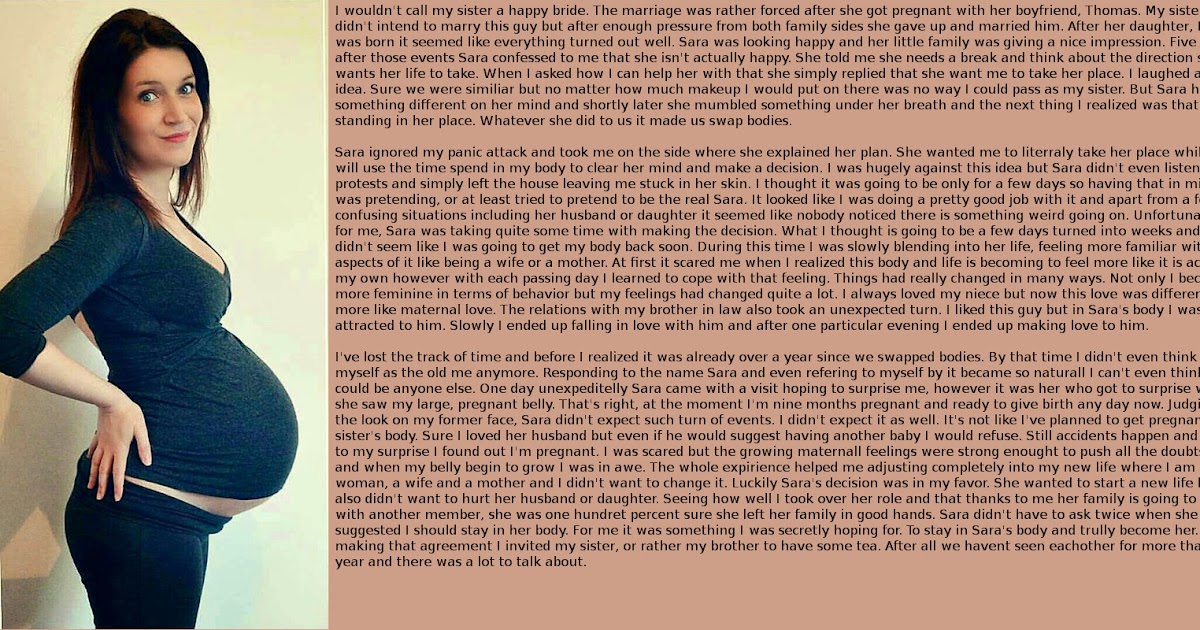 We wrote about this above and are ready to repeat it every time when it comes to planning a pregnancy.
We wrote about this above and are ready to repeat it every time when it comes to planning a pregnancy.
But, as a rule, if you are under 30 and you carefully monitor your health when planning a pregnancy, you have every chance to conceive healthy children. nine0003
30-34 years old
At the age of 35 years, the probability of conceiving a child is still high and is also 86%. But, unfortunately, the probability of miscarriage increases and is approximately 20%.
In addition, after the age of 30, many women develop chronic diseases that can negatively affect pregnancy.
When preparing for pregnancy at this age, it is most important to pay attention to your health. If conception does not occur after 12 months of active sexual activity, it is necessary to consult a reproductive specialist. nine0003
35-39 years old
Is it possible to get pregnant after 35 years? This question is not just so worried about many women. The fact is that female fertility begins to decline rapidly after 35 years.
Despite this, there are chances of getting pregnant after 35 years. The probability of conception during the year is 78%.
However, let's talk about the decline in female fertility. Such a process in the female body is the main reason for the increased risk of transmission of chromosomal disorders, which negatively affect the viability of the egg and embryo. This phenomenon is due to the fact that the egg contains less energy to be able to correctly distribute the genetic material and provide, at the expense of its energy, the early stages of development and implantation of the embryo. Therefore, the likelihood of conception of an embryo with chromosomal abnormalities (for example, Down syndrome) increases. We will talk more about chromosomal abnormalities in our next articles. nine0003
We would like to emphasize again that if you take your health responsibly and undergo the correct examination during the period of preparation for pregnancy, consult a reproductive specialist, many disorders during pregnancy can simply be prevented.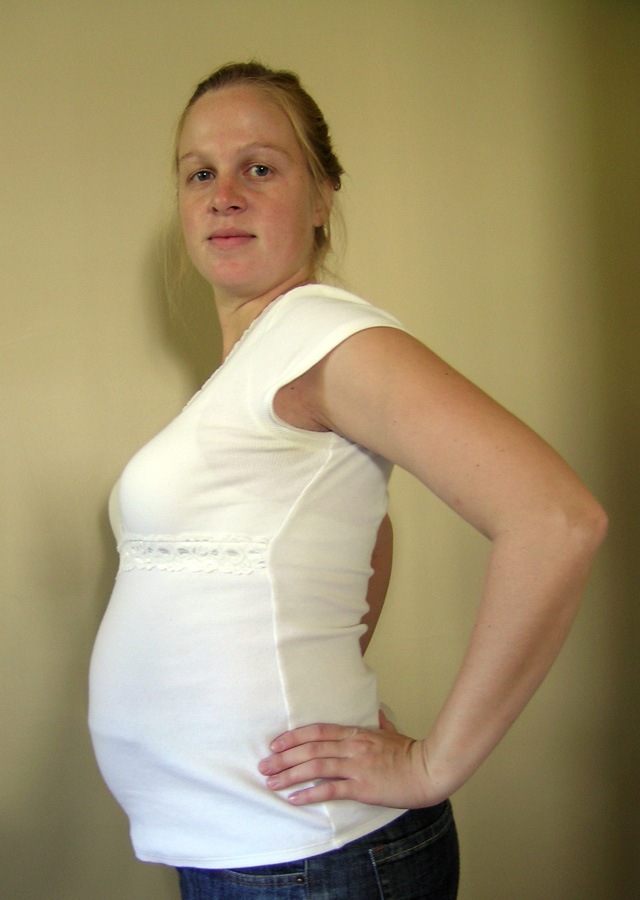
If you are aged 35-39 and are trying to get pregnant, we do not recommend that you wait the full 12 months. Do not waste time, because. at this age, every month counts, and if you have not been able to get pregnant for six months, you should contact a specialist and go through all the necessary tests. nine0003
40 to 44
Between the ages of 40 and 44, a woman may only ovulate a few times in 12 months as the body's egg supply and production of estrogen and progesterone decline. The probability of getting pregnant at this age is very small, but this does not mean that conception after 40 is impossible at all.
The main thing is to correctly approach pregnancy planning. Of course, it is better not to postpone such an important event for a long time. And this is not only our recommendation, but also the recommendation of all the leading reproductologists in the world. nine0003
Let's recap!
Pregnancy is wonderful, and planning, conceiving and giving birth to a healthy baby is undoubtedly the best and most important event in the life of every woman. And if you approach this process as responsibly as possible, regularly undergo medical examinations, lead a healthy lifestyle and periodically take vitamins that are important for the female body, you will definitely have healthy and happy children.
And if you approach this process as responsibly as possible, regularly undergo medical examinations, lead a healthy lifestyle and periodically take vitamins that are important for the female body, you will definitely have healthy and happy children.
Remember, women's reproductive age has its limits, but cases of infertility are correctable. If you cannot conceive naturally, modern and effective reproductive technologies that are used in the Reprolife Medical Center will help you. Among them: ICSI, PGT-A (NGS), PGT-M, PGT-SR, TESA. nine0003
Our team of professionals specializes in the treatment of all forms of infertility and comprehensive pregnancy management.
We will take care of the birth of healthy children in your family!
Pregnancy after 35 years: how to properly prepare?
In today's world, pregnancy after the age of 35 is regarded as a common situation and is becoming more common every year. This is due to the fact that women first build a career and only then think about the birth of their first child.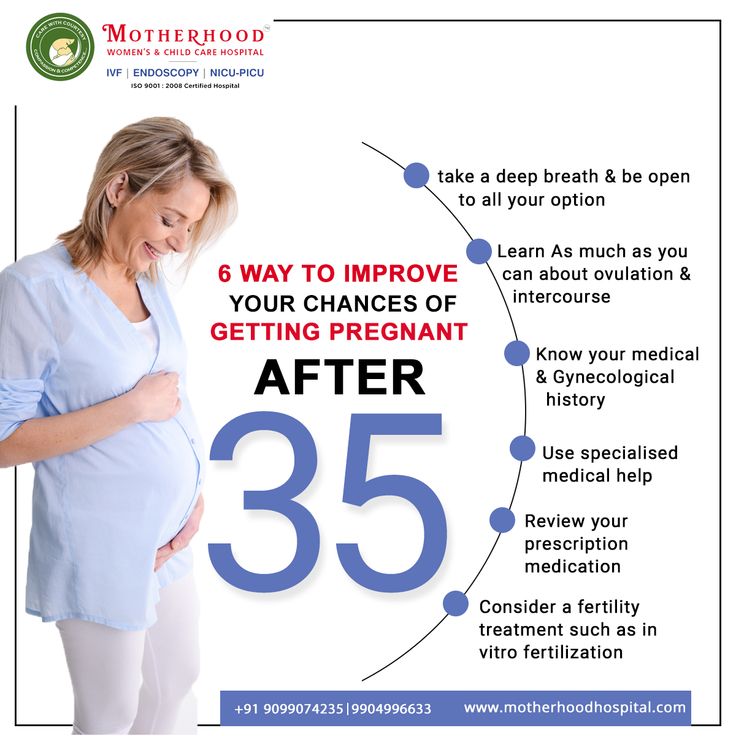 A second child after 35 years is also common, often in families the oldest child has already reached adolescence when he has a brother or sister. Every woman needs to know about the features, possible risks, planning and proper preparation for pregnancy after 35 years. nine0003
A second child after 35 years is also common, often in families the oldest child has already reached adolescence when he has a brother or sister. Every woman needs to know about the features, possible risks, planning and proper preparation for pregnancy after 35 years. nine0003
What are the difficulties of pregnancy after 35?
Fertility (ability to bear children) is an indicator that gradually decreases with age. Usually, fertility begins to decline after 30-32 years, depending on the characteristics of the woman's body. However, this does not mean that after 30-35 years, a physiological first pregnancy without any complications is impossible.
Average dependence of fertility on the woman's age
| Age | Probability of conception during the year |
| 25 years old | 87. |
| 30 years old | 83.9% |
| 35 years old | 73.3% nine0083 |
| 40 years old | 49.4% |
After the age of 35, a woman may have difficulty conceiving. It is important to remember that the age of a man also affects the likelihood of conception and intrauterine development of the fetus. Therefore, if any problems arise, both partners need to undergo a comprehensive medical examination.
If healthy men and women over 35 years of age have regular intercourse without the use of contraception, the chances of conception within 12 months remain quite high. nine0052
How to properly prepare?
Proper preparation is the key to a happy and healthy pregnancy after 35. Women at this age are already balanced about procreation, and some are planning to give birth to a second or third child. Preparing for the upcoming pregnancy is necessary for both a woman and a man.
Preparing for the upcoming pregnancy is necessary for both a woman and a man.
How to prepare for pregnancy after 35 years:
- Lead a healthy lifestyle, give up bad habits. A balanced diet, regular exercise, quitting smoking and drinking alcohol - all this is necessary for the body to restore its internal resources and be ready for gestation and childbirth. nine0153
- Take folic acid 3 months (there are contraindications, you must consult your doctor) before the expected pregnancy. This substance is necessary for the normal formation of the fetal nervous system, and additional intake is especially important for women over 35 years of age.
- Find a qualified gynecologist or reproductologist (this is a doctor who deals specifically with the issues of conception and gestation) with experience in managing pregnant women over 35 years old. It is important that the doctor understands the possible risks of such a pregnancy, but at the same time does not exaggerate and does everything possible for the natural course of pregnancy and childbirth.
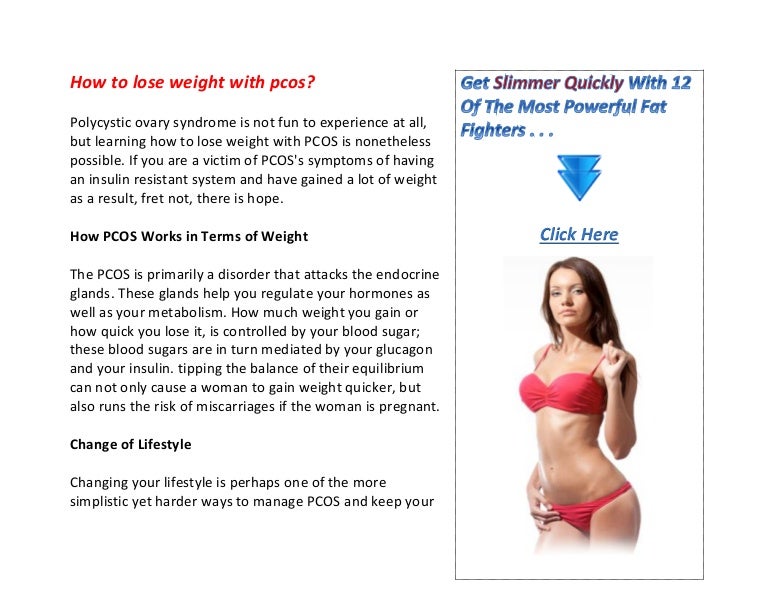 He will help in planning pregnancy, conduct an examination, prescribe a competent treatment for existing gynecological diseases. nine0153
He will help in planning pregnancy, conduct an examination, prescribe a competent treatment for existing gynecological diseases. nine0153 - Undergo a general physical examination. Every woman planning childbirth after 35 should consult a therapist, take a general and biochemical blood test, a general urine test, as well as examine the mammary glands and check thyroid hormones.
- Screen for sexually transmitted infections. Many infections have a chronic course and practically do not manifest themselves in any way, but they can prevent the conception and bearing of a child. Both partners should be screened for such infections. It is also advisable to be examined for viral hepatitis and to know your HIV status. nine0153
- Visit genetics. After 30 years, the risk of various chromosomal abnormalities and genetic defects in the fetus increases. Therefore, the couple should always consult with a geneticist, if necessary, take tests.
A positive attitude and a stable psycho-emotional state of future parents are very important, therefore, in some cases (especially if there are problems with conception), a couple is recommended to work with a psychologist.
What are the risks? nine0066
With age, each person develops various chronic diseases, as well as the endurance and ability of the body to recover.
The hormonal background also changes after 35 years of age, which carries certain risks:
- Women who become pregnant after 35 years of age increase the risk of a negative effect of pregnancy on the cardiovascular system. This is manifested by an increase in blood pressure, a deterioration in the condition of the walls of blood vessels (in women who gave birth after 40 years, the risk of strokes in the future increased). nine0153
- Increased risk of preterm birth, miscarriage and fetal death. It is important to have regular check-ups and if you have any concerns, see a doctor right away.
- Increased risk of developing gestational diabetes. During pregnancy, it is advisable to limit the intake of added sugar and switch to a predominantly plant-protein diet.
- Increased risk of chromosomal abnormalities in a child.
 After 35 years, the chances of giving birth to a child with Down syndrome and other genetic abnormalities are higher, since the genetic material of the mother and father accumulates mutations with age. nine0153
After 35 years, the chances of giving birth to a child with Down syndrome and other genetic abnormalities are higher, since the genetic material of the mother and father accumulates mutations with age. nine0153
Although these risks exist, with the right approach, pregnancy and the birth of a healthy child after 35 years of age is confirmed by many women and doctors.
Reviews of doctors and patients about pregnancy after 35
The fact that childbirth and pregnancy after 35 is not always a difficult test is confirmed by numerous reviews:
It's never too late to become a mother." nine0193 Irina, 37 years old
"Pregnancy with my second son after 35 years was more difficult for me than the first one. But the child was born healthy, and I recovered quite quickly after childbirth." Anna, 36 years old
"I always treat pregnancy after 35 with great attention, patients undergo all necessary screenings.
 5%
5% 